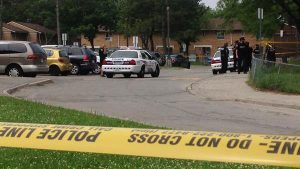
A 15-year-old is gunned down in an apartment stairwell in Regent Park in late January. Not even a week later, a 9-year-old is shot dead in his own home in Brampton as a bullet tears through a window from outside. In the month of February in Toronto, two 15-year olds and a 19-year-old have been robbed of their lives, the victims of gunshot violence. The details and frequency of these murders could rival the action in a Hollywood gangster movie.
Homicide rate declines
In fact, the Toronto Police Service reports that the homicide rate has declined slightly in recent years but the number of homicides by firearms has risen. Police data show that of this rising number, a disproportionate number of both the victims and offenders are black and have their roots in the Somali community.
We are horrified at the brazen nature of the shootings, often committed in public places and most often claiming victims in their teens and twenties. As witnesses, a common response is rejection and contempt. “What are they doing to our city?” This has never been a part of Toronto’s common experience and Torontonians don’t want it to be.
Community seeks assistance
Sadly, this understandable reaction only serves to further alienate the struggling Somali community, which views itself as being in crisis. Community advocate Mohamed Farah, a youth mentor in Toronto who works with Somali Canadians, feels that the problem has spun out of control. ‘Our kids are dying,’ he said, and openly admitted that assistance is needed to combat the alarming trend.
Bridging the settlement issue has never been an easy task for incoming groups. The Somali settlement experience has been particularly challenging. Understanding the situation is the key to finding solutions.
Fleeing a country in the midst of a civil war, most Somalis arrived with no documentation or belongings. Witnesses to violence, many have suffered the effects of trauma such as Post Traumatic Stress Disorder (PTSD). Unable to speak English, there has been an immediate barrier to securing employment.
The poverty that ensued has not easily been remedied by education and upgrading. Many refugees and their foreign-born children faced the tuition fees of foreign students and have not been eligible for funding through student loans.
Downward Spiral
 While education was mandated for children, limited language skills have hindered progress. Foundational learning was missed, creating the compounding spiral of academic failure. Success became the exception, sewing the seeds for feelings of marginalization and hopelessness. Children did eventually learn the language and as children do, they began to integrate and understand the nuances of life in Toronto. The children became the experts and the parents became dependent on them for interpretation.
While education was mandated for children, limited language skills have hindered progress. Foundational learning was missed, creating the compounding spiral of academic failure. Success became the exception, sewing the seeds for feelings of marginalization and hopelessness. Children did eventually learn the language and as children do, they began to integrate and understand the nuances of life in Toronto. The children became the experts and the parents became dependent on them for interpretation.
The role reversal compromised parental control and influence. With limited education and job training, and an unemployment rate approaching 20% in the Somali community, these are the young people who are finding themselves drawn into a criminal culture today.
Shifting the trend
Stopping this negative trend is certainly the goal. Putting in place a financial and social infrastructure to support transformation is critical.
Somali Canadians who work in the community could be powerful agents for change by providing information about services and resources and by encouraging others to help themselves. They could play a vital role in fostering trust so that community members are more inclined to work with law enforcement in the fight against crime.
The presence of Somali teachers, police officers and community workers would provide much needed, positive role models. Bridging language and cultural barriers by encouraging parental participation in school readiness programs would promote a more successful transition into the school system.
All Torontonians are responsible to turn the tide on the trend of increased gun violence. By working together, we can create an environment that is supportive and inclusive, encouraging young people to invest their time and energy into more positive, meaningful endeavours.
